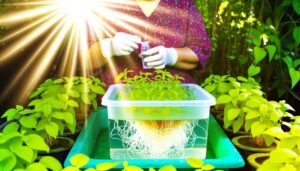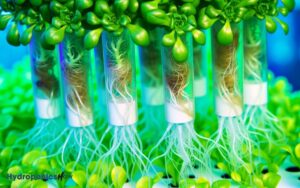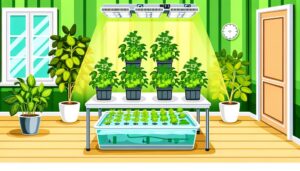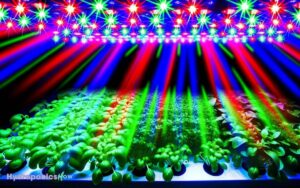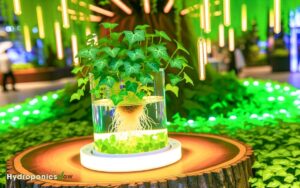Expert Gardener’s Top 10 Plant Foods for Hydroponics to Achieve Optimal Nutrients
Expert Gardener Plant Food is meticulously formulated for hydroponics, delivering essential nutrients directly to your plants’ roots.
It provides ideal ratios of macronutrients like nitrogen, phosphorus, and potassium, along with essential micronutrients, ensuring robust plant growth. The solution improves bioavailability and includes pH stabilizers for a consistent growing environment.
Follow precise mixing and dosage guidelines for the best results, applying every two weeks and monitoring pH and EC levels. Accurate measurements and proper storage are key to maintaining nutrient efficacy.
Discover more about maximizing your hydroponic garden’s potential using Expert Gardener Plant Food by exploring further.
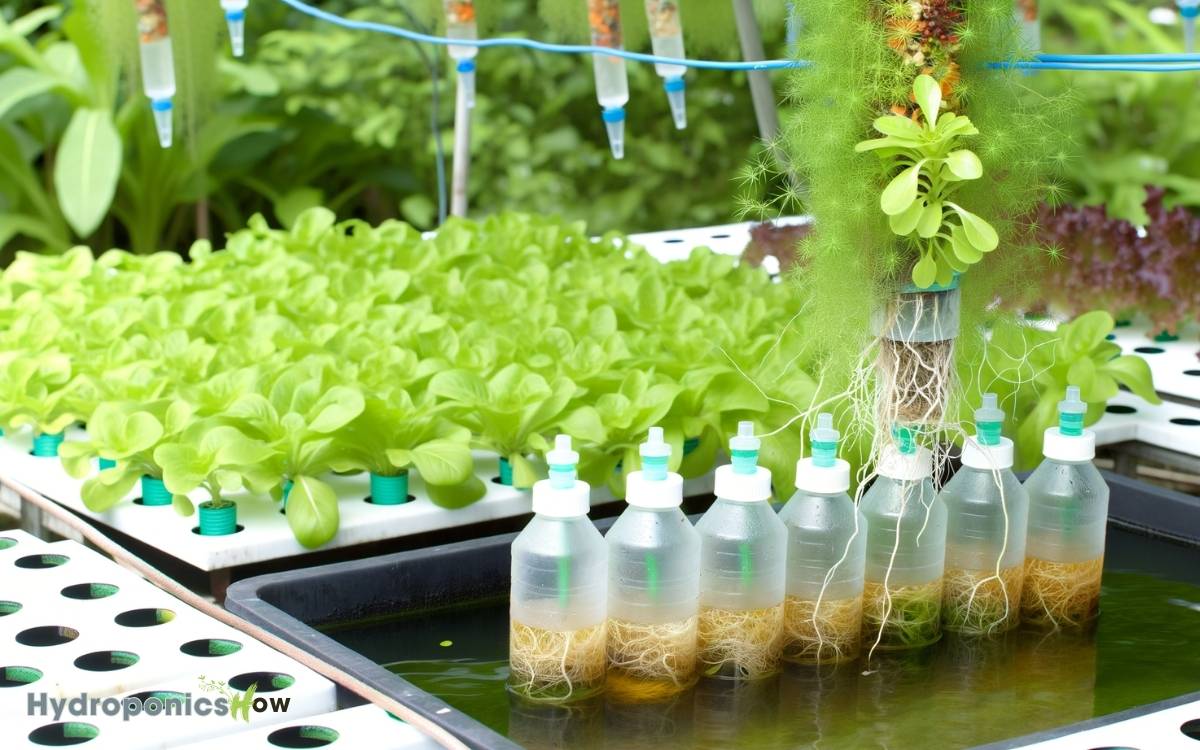
Key Takeaways
Benefits of Hydroponic Gardening
With hydroponic gardening, you can achieve faster plant growth and higher yields by delivering nutrients directly to the roots. This method eliminates the need for soil, reducing the risk of soil-borne diseases and pests.
You’ll use a nutrient solution, precisely balanced, to guarantee ideal plant health. Since hydroponic systems allow for better control over growing conditions light, temperature, and humidity you can create an ideal environment for each plant species.
Additionally, hydroponics often requires less water than traditional soil gardening because the system recycles water. By monitoring pH levels and electrical conductivity, you can fine-tune the nutrient delivery to match the plant’s growth stage.
Therefore, hydroponic gardening offers precision, efficiency, and superior control over plant cultivation.
Understanding Plant Nutrients
To optimize your hydroponic system, you need to understand the essential roles of macronutrients like nitrogen, phosphorus, and potassium.
Equally important are micronutrients such as iron, manganese, and zinc, which support specific plant functions.
Recognizing the balance and interaction between these nutrients will help you achieve robust plant growth and high yields.
Essential Macronutrient Roles
Understanding the roles of essential macronutrients nitrogen, phosphorus, and potassium is essential for optimizing plant growth in hydroponic systems.
Nitrogen drives vegetative growth by promoting the development of lush, green foliage. You’ll need to balance nitrogen levels carefully to avoid excessive foliage at the expense of fruit and flower production.
Phosphorus is important for energy transfer and root development; it enhances photosynthesis and supports flowering and fruiting stages.
Potassium regulates water uptake, enzyme activation, and overall plant health, improving disease resistance and stress tolerance.
Monitoring and adjusting these macronutrient levels ensures your plants receive the balanced nutrition necessary for robust growth and maximum yield in a hydroponic setup. Understanding these roles will make you more adept at fine-tuning plant nutrition.
Key Micronutrient Necessities
While macronutrients form the backbone of plant nutrition, key micronutrients like iron, manganese, and zinc play important roles in enzymatic functions and overall plant vitality in hydroponic systems.
Iron is essential for chlorophyll synthesis, ensuring your plants remain green and healthy. Manganese aids in photosynthesis and nitrogen assimilation, preventing yellowing leaves. Zinc, fundamental for protein synthesis and growth regulation, helps maintain robust plant structure.
Here’s a quick reference table:
| Micronutrient | Function | Deficiency Symptoms |
|---|---|---|
| Iron | Chlorophyll synthesis | Yellowing leaves |
| Manganese | Photosynthesis, nitrogen assimilation | Interveinal chlorosis |
| Zinc | Protein synthesis, growth regulation | Stunted growth, leaf deformation |
Understanding these micronutrients ensures your hydroponic garden thrives.
Why Choose Expert Gardener
Expert Gardener offers a meticulously formulated plant food designed specifically for hydroponic systems, guaranteeing peak nutrient delivery and robust plant growth.
You should choose Expert Gardener because it ensures:
- Optimal Nutrient Ratios: Balanced macro and micronutrients tailored for hydroponic absorption.
- Enhanced Bioavailability: Secures nutrients are in forms readily uptaken by plant roots.
- Consistency and Reliability: Manufactured to stringent standards for uniformity in each batch.
Key Ingredients
You’ll find that Expert Gardener Plant Food incorporates a meticulously balanced blend of essential nutrients to guarantee ideal plant growth.
It also includes organic additives to support sustainable agriculture and enhance nutrient uptake.
Additionally, pH balancing components are integrated to stabilize the hydroponic solution, ensuring a consistent growing environment.
Essential Nutrients Blend
A successful hydroponic system hinges on a meticulously crafted blend of essential nutrients, including nitrogen, phosphorus, and potassium, to guarantee ideal plant growth.
Each element plays a pivotal role:
- Nitrogen: Essential for chlorophyll production, nitrogen ensures robust leaf growth and overall plant vitality.
- Phosphorus: Important for energy transfer through ATP, it promotes root development and flowering.
- Potassium: Enhances water uptake and enzyme activation, contributing to overall plant health and disease resistance.
Organic Additives Included
Incorporating organic additives like kelp extract, humic acids, and beneficial microbes can greatly enhance nutrient uptake and overall plant health in your hydroponic system.
These additives contribute to root development, stress resilience, and nutrient absorption efficiency. Kelp extract supplies essential phytohormones, boosting growth rates.
Humic acids improve soil structure and cation exchange capacity, ensuring nutrients are more readily available. Beneficial microbes, such as mycorrhizae, form symbiotic relationships with roots, enhancing nutrient and water uptake.
| Additive | Primary Benefit | Secondary Effect |
|---|---|---|
| Kelp Extract | Enhances growth rates | Improves stress tolerance |
| Humic Acids | Enhances nutrient availability | Improves soil structure |
| Mycorrhizae | Boosts nutrient uptake | Increases water retention |
| Beneficial Bacteria | Enhances root health | Promotes disease resistance |
| Fulvic Acids | Improves nutrient absorption | Increases energy metabolism |
These organic elements work synergistically to optimize your hydroponic environment.
Ph Balancing Components
Maintaining ideal pH levels is essential for nutrient uptake in hydroponic systems, and key ingredients like potassium hydroxide and phosphoric acid play a pivotal role in this process.
You need to use these components to adjust the pH effectively, ensuring your plants absorb nutrients efficiently. Potassium hydroxide raises the pH, while phosphoric acid lowers it.
To achieve precise control, consider the following:
- Potassium Hydroxide (KOH): Increases pH, ideal for acidic nutrient solutions.
- Phosphoric Acid (H₃PO₄): Lowers pH, suitable for alkaline conditions.
- pH Testing Kits: Essential for monitoring and maintaining ideal pH levels.
How It Works
Understanding how Expert Gardener Plant Food functions in hydroponics involves analyzing its nutrient delivery system and how it optimizes plant growth.
The formula delivers essential macro and micronutrients directly to the plant roots, bypassing soil. This guarantees efficient nutrient uptake and minimizes waste.
Key components include nitrogen, phosphorus, and potassium, which are crucial for foliage, root, and flower development, respectively.
Chelated micronutrients like iron, manganese, and zinc enhance absorption and prevent deficiencies. The balanced pH stabilizers ensure that nutrient solubility remains at its best, promoting robust growth.
Application Instructions
To achieve peak growth, you’ll need to follow precise guidelines for mixing plant food, determining dosage, and setting application frequency.
Guarantee accurate measurements for nutrient solutions and adhere to recommended storage protocols to maintain nutrient efficacy.
Understanding these instructions will maximize your hydroponic system‘s performance.
Mixing Plant Food
Start by dissolving one teaspoon of Expert Gardener Plant Food in one gallon of water, making sure the mixture is thoroughly stirred for uniform consistency.
This guarantees that nutrients are evenly distributed, preventing any localized nutrient concentration that might harm your plants.
Maintain a consistent stirring motion to prevent sedimentation. After mixing, let the solution sit for a few minutes to ensure complete dissolution.
By following these steps, you’ll create a nutrient-rich solution that supports robust plant growth in your hydroponic system.
- Use a clean container: Residual chemicals can alter the nutrient balance.
- Check water pH: Aim for a pH between 5.5 and 6.5 for best nutrient absorption.
- Use lukewarm water: It aids in dissolving the plant food more effectively.
Dosage and Frequency
Typically, you’ll want to apply Expert Gardener Plant Food to your hydroponic system every two weeks to maintain peak nutrient levels.
For dosage, measure 5 milliliters of the concentrated solution per liter of water in your reservoir. Guarantee even distribution by mixing thoroughly.
Monitor your plants’ growth and adjust the concentration if needed; certain plants may require more or less based on their growth stage and nutrient uptake rates.
Use a digital pH meter to keep the solution within the ideal pH range of 5.5 to 6.5, ensuring maximum nutrient absorption.
Additionally, regularly check the electrical conductivity (EC) levels to confirm that the nutrient concentration remains within the desired range, typically between 1.0 and 2.5 mS/cm.
Nutrient Solution Storage
Storing your nutrient solution correctly is crucial for maintaining its effectiveness and ensuring ideal plant growth. To achieve this, you need to take into account several factors.
- First, always keep the solution in a cool, dark place to prevent light degradation and microbial growth.
- Second, use an airtight container to avoid contamination and evaporation.
- Third, regularly check the pH and Electrical Conductivity (EC) levels to guarantee nutrient stability.
Optimal Dosage
To achieve peak growth in your hydroponic garden, it’s crucial to measure and administer the correct dosage of Expert Gardener Plant Food based on your specific plant’s needs.
Start by identifying the growth stage of your plants seedling, vegetative, or flowering. The nutrient concentration should be tailored accordingly.
For seedlings, use a diluted solution at 1/4 strength. During the vegetative stage, increase the concentration to 1/2 strength. In the flowering stage, apply the full-strength solution.
Monitor the electrical conductivity (EC) and pH levels of your nutrient solution regularly, aiming for an EC range of 1.0-2.5 mS/cm and a pH of 5.5-6.5. Adjust as necessary to maintain these optimal conditions for nutrient uptake and plant health.
Compatible Plants
Understanding the best dosage is just one part of successful hydroponic gardening; selecting compatible plants guarantees you maximize the benefits of Expert Gardener Plant Food. Certain plants thrive under hydroponic conditions when paired with this nutrient solution. Leafy greens like lettuce and spinach, for example, respond exceptionally well when given the appropriate hydroponic solution per plant. Herbs such as basil and cilantro also benefit from the balanced nutrients, promoting faster growth and higher yields. By carefully choosing plants suited to this method, gardeners can ensure healthier crops and more efficient nutrient absorption.
Consider these options:
- Leafy Greens: Lettuce, spinach, and kale flourish due to their rapid growth cycles and nutrient uptake efficiency.
- Herbs: Basil, mint, and cilantro benefit from the balanced nutrient profile, enhancing their aromatic and culinary qualities.
- Fruiting Plants: Tomatoes, peppers, and cucumbers require precise nutrient delivery, making Expert Gardener Plant Food an excellent choice.
Selecting plants with high nutrient demands and rapid growth rates ensures outstanding results. Understanding each plant’s specific needs allows you to tailor your hydroponic system for peak productivity.
Mixing Techniques
Consistently achieving ideal nutrient balance in your hydroponic system depends on precise mixing techniques. Start by measuring each nutrient component accurately using a digital scale.
Dissolve each nutrient in warm, distilled water separately to guarantee complete solubility. Combine the nutrient solutions in the reservoir, maintaining a specific order: micronutrients, calcium nitrate, then potassium and magnesium sulfates. This prevents nutrient lockout.
Stir thoroughly but avoid aeration to prevent pH fluctuations. Use a calibrated pH meter to adjust the solution to the desired pH range (usually 5.5 to 6.5). Employ an EC (electrical conductivity) meter to verify nutrient concentration.
Regularly recalibrate your tools for consistent accuracy. Mastering these techniques ensures optimal plant growth and maximizes your hydroponic success.
Storage Tips
Once you’ve mastered mixing your nutrient solutions, proper storage of these solutions is vital to maintaining their efficacy and stability. You’ll want to make sure that your nutrient solutions remain uncontaminated and retain their chemical integrity.
Here are some essential tips:
- Temperature Control: Store your solutions in a cool, dark place. Fluctuations in temperature can degrade the nutrients.
- Light Exposure: Protect the solutions from direct sunlight. UV light can alter the chemical composition.
- Seal Properly: Always use airtight containers. Exposure to air can lead to oxidation and contamination.
Troubleshooting Common Issues
Encountering nutrient imbalances, root rot, or algae growth in your hydroponic system can greatly hinder plant health and productivity. To troubleshoot these issues, you need to identify symptoms and apply corrective measures.
| Issue | Symptoms | Solutions |
|---|---|---|
| Nutrient Imbalance | Yellowing leaves, stunted growth | Adjust nutrient mix, monitor pH levels |
| Root Rot | Discolored, mushy roots, foul odor | Improve aeration, use beneficial microbes |
| Algae Growth | Green slime on surfaces, reduced light | Block light, clean system, use algaecide |
Analyzing these common problems requires understanding the root cause. For nutrient imbalances, regularly check and adjust your water’s pH and nutrient levels.
Root rot often stems from poor oxygenation and can be countered by increasing air circulation and adding beneficial microbes. Algae growth thrives in light; mitigate it by shielding your reservoir from light and maintaining cleanliness.
Customer Testimonials
Customers rave about the efficacy of Expert Gardener Plant Food in enhancing hydroponic yields and plant health.
You’ll find testimonials highlighting its superior nutrient formulation, which optimizes plant growth phases and guarantees robust root development.
Users appreciate the consistent results, noting measurable improvements in both foliage density and bloom frequency.
- Enhanced Nutrient Uptake: Customers report significant nutrient absorption, leading to lush, vibrant plants.
- Balanced pH Levels: The solution maintains ideal pH balance, essential for hydroponic systems.
- Improved Growth Rates: Many users observe accelerated maturation and increased crop yield.
These firsthand accounts underscore the technical advantages of Expert Gardener Plant Food, making it a reliable choice for anyone serious about hydroponic gardening.
Purchasing Options
You’ll find multiple purchasing options for Expert Gardener Plant Food, each designed to cater to different hydroponic needs and scales.
For small-scale setups, consider the 1-pound and 2-pound packages, which provide sufficient nutrients for home gardens.
Medium-scale operations might benefit from the 5-pound and 10-pound options, offering a balance between cost-efficiency and quantity.
Large hydroponic farms can opt for bulk purchases, such as the 25-pound and 50-pound bags, ensuring sustained nutrient supply and reduced per-pound costs.
Additionally, subscription services are available, allowing you to receive plant food at regular intervals without the hassle of reordering.
Analyze your specific requirements and choose a plan that maximizes growth efficiency and minimizes resource expenditure.
Conclusion
While traditional soil gardening has its merits, hydroponic gardening offers unmatched nutrient control and faster growth.
Expert Gardener’s plant food stands out with its precise nutrient blend and ease of use. You’ll marvel at the vibrant, healthy plants it produces compared to conventional methods.
Store it properly, and follow our troubleshooting tips for best results. The juxtaposition of hydroponic efficiency with traditional gardening’s limitations underscores why Expert Gardener is the smart choice for serious growers.


